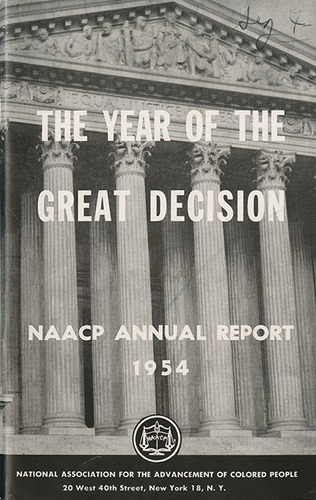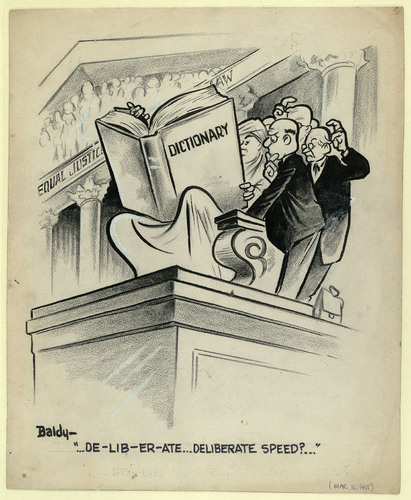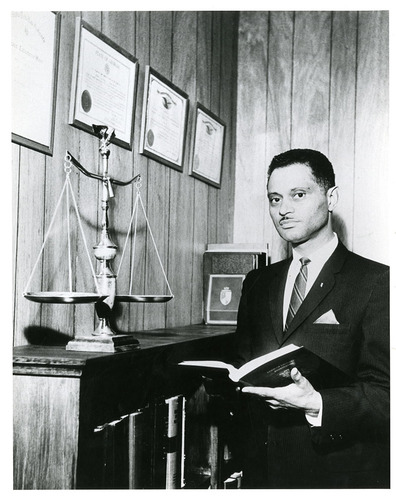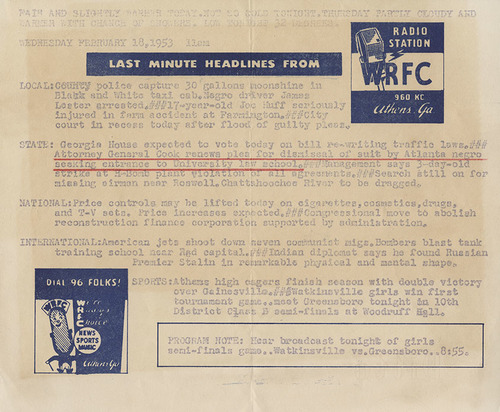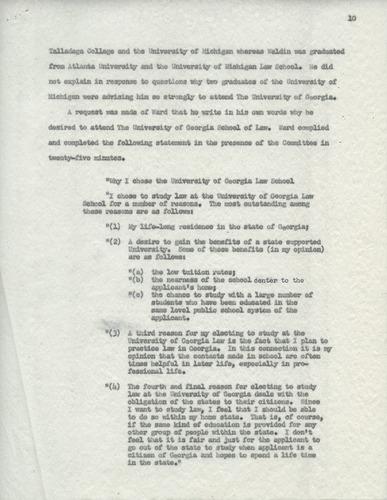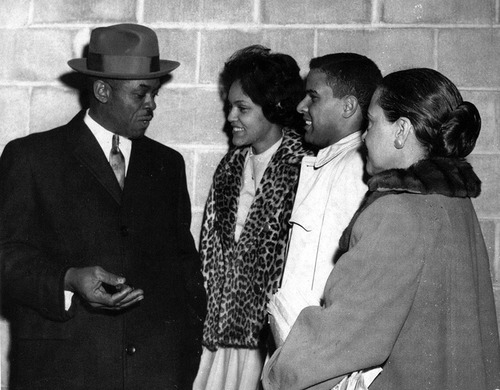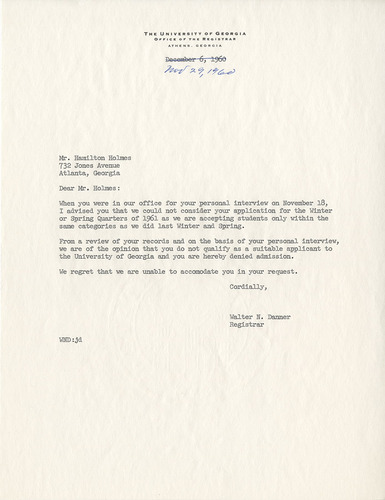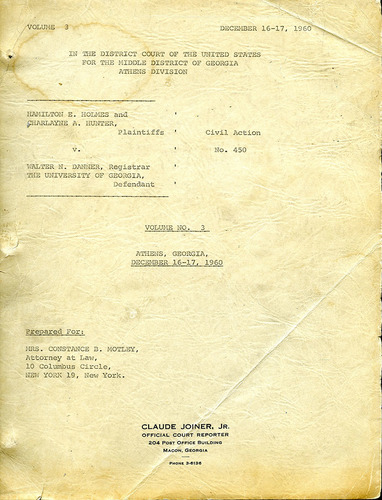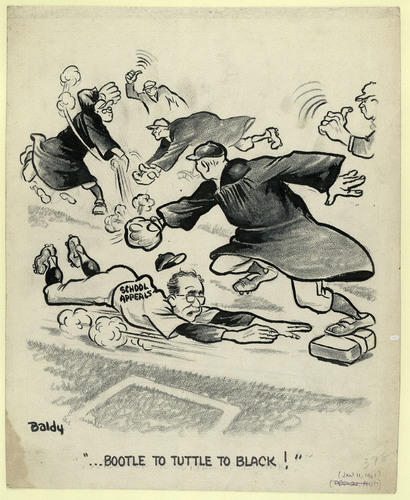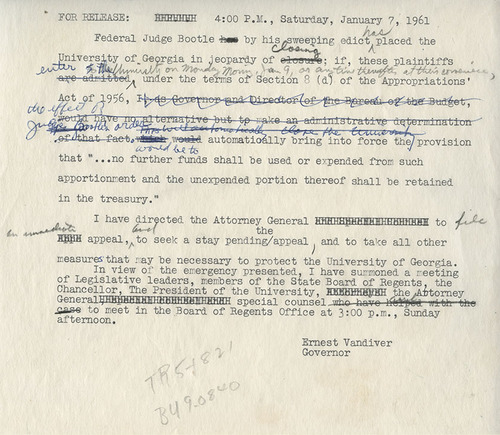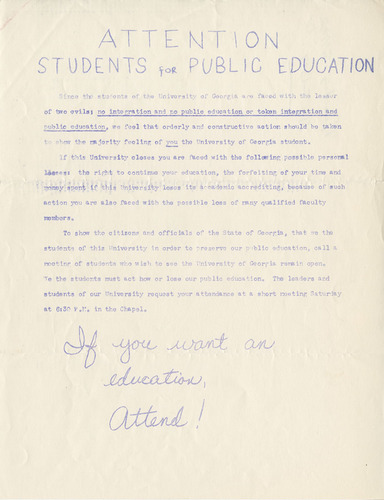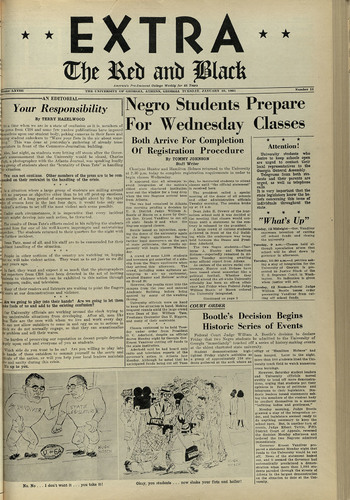Legal Challenges
Brown v. Board of Education
On May 17, 1954 the U.S. Supreme Court handed down its decision in the case of Brown v. Board of Education of Topeka, which ruled legal segregation in public schools unconstitutional. A major triumph for the Civil Rights Movement, the ruling enraged white southern leaders who decried the decision as federal encroachment on states’ rights and a profound threat to the “traditional way of life” in the South. The Brown decision fueled a prolonged campaign of massive resistance by fearful whites across the region.
Horace T. Ward v. Board of Regents
Horace T. Ward, a graduate of Morehouse College, first applied to the University of Georgia School of Law in 1950. After a series of measures to stalemate his application, the Board of Regents ultimately denied him admission, and Ward filed suit in 1952. He received a draft notice from the U.S. Army four weeks before his hearing date in 1953, which delayed the case. Finally granted his day in court in 1957, Judge Frank Hooper dismissed the case because Ward had not exhausted all “administrative recourses,” and, since Ward had already enrolled in Northwestern University’s law school in 1956, the case was moot. Ward would later serve on the legal team that represented Hamilton Holmes and Charlayne Hunter in their suit to gain admission to UGA.
-----
During Horace T. Ward’s admission interview committee officials asked him why he wanted to attend the University of Georgia’s law school and requested that he submit a written response. Page ten of the final report, shown here, displays Ward’s four-point response.
Holmes v. Danner
In the late 1950s, groups like the National Association for the Advancement of Colored People (NAACP) and the Atlanta Committee for Cooperative Action (ACCA) began recruiting promising Black students to challenge segregation in Georgia’s colleges. Identified as top students at Henry McNeal Turner High School, Hamilton Holmes and Charlayne Hunter were encouraged to apply to the University of Georgia in 1959. University registrar Walter Danner denied their applications, citing a lack of available housing on-campus.
Clip of students debating integration at UGA following the court-ordered admission of Charlayne Hunter and Hamilton Holmes, January 1961, WSB-TV
In the months that followed, Holmes enrolled at Morehouse College in Atlanta while Hunter began attending Wayne State University in Detroit, Michigan. The pair resubmitted their applications to UGA each new quarter over the coming year. After continued rejections, they filed suit against the university in federal court on September 2, 1960 represented by Atlanta attorneys Donald Hollowell, Horace T. Ward, and Vernon Jordan as well as the NAACP Legal Defense Fund’s Constance Baker Motley.
-----
On January 6, 1961, Judge William Bootle ordered UGA to admit Holmes and Hunter, ending nearly two centuries of racial segregation at the state’s flagship university. Bootle’s ruling stated that the pair “would have already been admitted had it not been for their race and color.”
On January 7, 1961, Governor S. Ernest Vandiver issued a statement declaring that Judge Bootle’s decision to admit Holmes and Hunter had jeopardized the future of UGA because section 8 of the Appropriations Act of 1956 limited state funding to segregated schools. On January 9, 1961, Holmes and Hunter arrived on campus to register for classes. At midnight, Vandiver released a statement ordering the University closed, but he had neither signed a closure order nor transmitted official instructions to UGA administrators. As such, UGA never closed, and two days later, Judge Bootle overturned the order.

